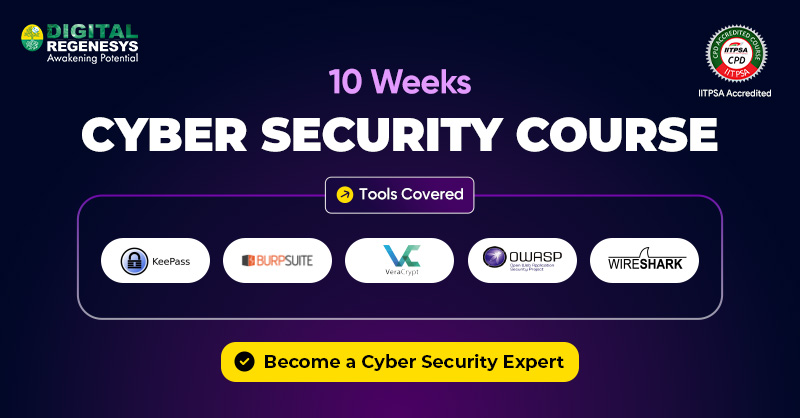Benefits of Taking an Online Cybersecurity Course

Cybersecurity is becoming one of the most important skills in today’s job market. With the rise of cyberattacks, data breaches, and online threats, businesses and individuals require professionals who can protect sensitive information and maintain secure systems.
Online cybersecurity courses offer a practical way to gain these skills without the constraints of traditional classroom learning. In this article, we explore the benefits of taking an online cybersecurity course. We demonstrate how it can help you develop technical knowledge, gain practical experience, and enhance your career opportunities. It also helps you stay current with the latest trends in the cybersecurity industry.

Top 9 Benefits of Taking an Online Cybersecurity Course
Online cybersecurity courses provide more than just technical knowledge; they offer a structured path to mastering the skills organisations urgently need. From learning to identify vulnerabilities to understanding the legal and regulatory frameworks, these courses prepare professionals to tackle real-world challenges effectively.
With hands-on labs, interactive content, and flexible learning schedules, participants can gain practical experience while advancing their careers.
Here are the top nine benefits you can expect from enrolling in an online cybersecurity course:
1. Flexibility and Convenience
Online cybersecurity courses offer unmatched flexibility, enabling learners to study at their own pace and on their own schedule. This is particularly advantageous for working professionals who wish to upskill without disrupting their current roles. With 24/7 access to course materials, video lectures, and assignments, learners can study at any time and from anywhere in the world.
Many platforms also offer recorded sessions, interactive forums, and downloadable resources, making it easy to revisit complex topics. Additionally, online courses often provide adaptive learning paths tailored to individual goals, allowing participants to focus on areas most important for their career advancement.
Key flexibility benefits include:
- Learn from anywhere, anytime
- Self-paced learning options
- Access to recorded lectures and resources
- Interactive discussion forums
- Integration with work and personal life
2. Building a Strong Foundation in Cybersecurity Concepts
Online cybersecurity courses provide learners with a solid foundation in essential concepts, enabling them to effectively address real-world cyber threats. Participants gain knowledge in networking, encryption, malware detection, firewalls, and system monitoring. Understanding these fundamentals allows learners to analyse vulnerabilities, implement security protocols, and design resilient systems.
Courses often include interactive exercises, quizzes, and labs, ensuring that learners not only understand theory but also gain hands-on experience in securing networks and systems. A solid foundation in cybersecurity concepts is critical for anyone aiming to specialise in areas like penetration testing, cloud security, or digital forensics.
Key foundational topics include:
- Networking fundamentals and protocols
- Encryption methods and secure communication
- Understanding malware and ransomware
- Firewalls, VPNs, and access controls
- Security monitoring and incident response
Explore details on Is Cyber Security a Good Career?
3. Exposure to Practical Skills
One of the primary advantages of online cybersecurity courses is their emphasis on practical skills. Learners participate in simulated labs, real-world case studies, and exercises that replicate the challenges faced by organisations. Practical experience enables students to develop the ability to identify threats, implement adequate security measures, and respond to incidents promptly.
For example, learners may perform penetration testing to identify vulnerabilities, conduct vulnerability scanning, or develop policies to protect sensitive data. These hands-on skills are invaluable when transitioning from training to the workplace, ensuring that participants are job-ready and confident in applying their knowledge to real-world cybersecurity challenges.
Practical skills gained include:
- Threat analysis and detection
- Network and system security implementation
- Incident response and mitigation
- Ethical hacking techniques
- Cybersecurity policy compliance
4. Developing Problem-Solving and Analytical Skills
Cybersecurity is not just about technical knowledge; it also requires critical thinking, analysis, and strategic decision-making. Online courses train learners to assess risks, anticipate potential attacks, and devise practical solutions. Students learn to analyse system logs, detect anomalies, and make informed decisions under pressure.
Developing problem-solving skills prepares professionals to handle complex incidents, reduce organisational risks, and ensure compliance with regulatory frameworks. Moreover, analytical skills gained through exercises and simulations enhance the ability to evaluate security policies, recommend improvements, and lead initiatives that strengthen organisational resilience.
Key problem-solving skills include:
- Threat assessment and risk analysis
- Critical thinking in incident response
- Problem-solving under time-sensitive conditions
- Decision-making with limited information
- Using analytical tools to detect anomalies
Know more about Who Should Consider a Cybersecurity Course for Personal Knowledge.
5. Career Advancement Opportunities
Completing an online cybersecurity course significantly improves career prospects. Organisations across finance, healthcare, e-commerce, and government sectors actively seek professionals skilled in cybersecurity. Certified learners can pursue roles such as cybersecurity analyst, network security engineer, IT security consultant, or compliance officer.
Additionally, upskilling in cybersecurity opens doors to leadership positions, project management roles, and specialised domains like cloud security, digital forensics, or AI security. According to industry surveys, cybersecurity professionals often earn competitive salaries, with opportunities for rapid career progression.
By earning a recognised certification, learners demonstrate expertise, making them stand out in the competitive job market.
Career advancement benefits include:
- Increased employability in the tech and IT sectors
- Eligibility for specialised cybersecurity roles
- Opportunities for promotion and leadership positions
- Higher earning potential
- Access to growing industry demand
6. Cost-Effectiveness of Online Learning
Online cybersecurity courses are generally more cost-effective than traditional classroom training. They eliminate commuting, accommodation, and other logistical costs, making quality education accessible to a broader audience. Many platforms offer flexible payment options, subscriptions, and scholarships, enabling learners to invest in their professional growth without financial strain.
Despite the lower cost, these courses offer comprehensive content, expert instruction, and certification opportunities that are comparable to those of in-person programs. This cost-effectiveness, combined with high-quality learning, makes online cybersecurity courses an attractive choice for students, working professionals, and career changers alike.
Cost advantages include:
- Reduced travel and accommodation expenses
- Flexible payment and subscription options
- Access to high-quality course material at a lower cost
- Scholarships or discounted programs
- Value equivalent to traditional classroom courses
Get insights on How Do I Start A Career In Cyber Security?
7. Networking and Community Benefits
Many online cybersecurity courses provide opportunities to connect with instructors, industry experts, and peers from around the world. Discussion forums, group projects, and virtual events allow learners to exchange insights, share knowledge, and build professional networks. Networking in these communities exposes learners to emerging trends, job openings, and mentorship opportunities that may not be available locally.
Additionally, engaging with a global learning community helps develop essential soft skills, such as collaboration, communication, and teamwork, which employers highly value. Alumni networks and professional communities formed through online courses can continue to provide career support long after the course ends.
Networking benefits include:
- Connections with instructors and industry experts
- Collaboration with global peers
- Access to professional communities and forums
- Mentorship opportunities
- Exposure to emerging cybersecurity trends
8. Staying Updated with Industry Trends
Cybersecurity is a rapidly evolving field, with new threats, tools, and regulations constantly emerging. Online courses are frequently updated to reflect these trends, ensuring that learners stay current and relevant. Topics often include emerging technologies such as artificial intelligence, blockchain, cloud security, and Internet of Things (IoT) devices.
Additionally, learners gain insight into the changing regulatory frameworks, privacy laws, and compliance standards that exist globally. Staying informed enables professionals to implement proactive security measures, provide effective advice to organisations, and maintain a competitive edge in the industry.
Key industry updates include:
- Latest cybersecurity threats and mitigation strategies
- Emerging technologies like AI and blockchain security
- Cloud security best practices
- Updated legal and regulatory requirements
- Advanced tools and techniques in cybersecurity
9. Long-Term Professional Growth
Online cybersecurity courses are an investment in long-term career growth. Certification signifies expertise, credibility, and a commitment to ongoing professional development. Graduates can pursue continuous learning opportunities, specialise in advanced areas like AI security or digital forensics, and take on leadership roles in cybersecurity strategy and governance.
The skills and knowledge gained also allow professionals to adapt to evolving threats and technologies, ensuring sustained relevance in a dynamic field. Additionally, global recognition of certifications can open doors to international career opportunities, consultancy roles, and participation in high-impact projects across various industries.
Benefits for long-term growth include:
- Continuous learning in emerging technologies
- Transition into managerial or consultancy roles
- Specialisation in advanced cybersecurity domains
- Industry recognition and credibility
- Global career prospects

Conclusion
Taking an online cybersecurity course equips learners with technical expertise, practical skills, analytical thinking, and professional credibility essential for success in today’s digital world. Courses offer flexibility, cost-effectiveness, and exposure to real-world challenges while enabling career advancement, networking, and long-term professional growth.
By staying updated on emerging trends, learners gain a competitive advantage and can contribute meaningfully to organisational security. Whether starting a new career or enhancing existing skills, online cybersecurity education provides the knowledge and credentials needed to thrive in an increasingly connected world.
Enhance your skills and elevate your career with the Digital Regenesys Cybersecurity Certificate Course, a comprehensive program designed to equip learners with the tools, insights, and recognised certification to succeed in high-demand cybersecurity roles.
Visit Digital Regenesys today to explore courses and take your first step toward a thriving cybersecurity career.
Last Updated: 8 October 2025
